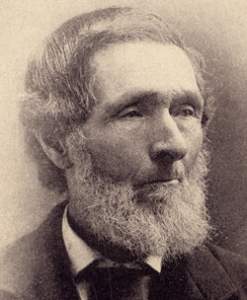William Henry Herndon (American National Biography)
Scholarship
Herndon read law with Lincoln and his partner, Stephen T. Logan. Lincoln and Herndon became law partners almost immediately after Herndon was admitted to the Illinois bar in December 1844. Their partnership lasted until 1861 when Lincoln left for Washington to become president. During those seventeen years, Herndon complemented Lincoln in almost every way—a Democratic newspaper would later describe him as “Lincoln’s Man Friday.” Herndon was the office manager, attending to the details Lincoln disliked; he tended to stay in Springfield while Lincoln rode circuit; he favored philosophical discourse while Lincoln preferred an earthy anecdote. It is difficult to specify Herndon’s influences on Lincoln; theirs was a relationship that drew its closeness from daily contact, not from singular conversations. Herndon himself would later describe their partnership as one in which he did the reading while Lincoln did the thinking.
Herndon was active in Illinois politics in his own right, and later on behalf of Lincoln. Initially, he was a Whig, concerned about the underprivileged, slaves, and women. He was a staunch advocate of temperance, in spite of his own later problems with excessive drinking. As mayor of Springfield in 1854 he supported the beginning of a public school system and local prohibition, being so strongly in favor of temperance that he was not reelected. He moved to the Republican party in 1856, which he supported with great public enthusiasm though he had private doubts about the choice of John C. Frémont as its presidential candidate.
Herndon was active in Illinois politics in his own right, and later on behalf of Lincoln. Initially, he was a Whig, concerned about the underprivileged, slaves, and women. He was a staunch advocate of temperance, in spite of his own later problems with excessive drinking. As mayor of Springfield in 1854 he supported the beginning of a public school system and local prohibition, being so strongly in favor of temperance that he was not reelected. He moved to the Republican party in 1856, which he supported with great public enthusiasm though he had private doubts about the choice of John C. Frémont as its presidential candidate.
Walter F. Pratt, "Herndon, William Henry," American National Biography Online, February 2000, http://www.anb.org/articles/11/11-00408.html.



